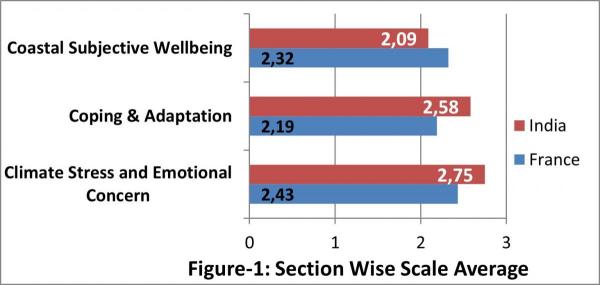Ruchi Mudaliar (OT-Med post-doc)
Alexandra Schleyer-Lindenmann (ESPACE)
Olivier Chanel (GREQAM / AMSE)
Parul Rishi (Indian Institute of Forest Management IIFM, Bhopal-India)
Many studies in the field of risk perception show evidence that besides knowledge, representations and feelings people have of the state of the environment are equally if not more influent on their risk perception. Even if people are well informed, they might not be inclined to adapt their behavior. In this contextregard, climate change is particularly difficult to understand and perceive for people, as it is seen as a slow and gradual process that has taken place over years and years. Though the impacts are very much obvious in recent times, the required urgency still is not experienced by most people. One of the reasons behind is that gradual climatic changes do not elicit the required anxiety that people have because of a feeling of lack of control over catastrophic consequences. Climate change is thus not perceived as an “immediate risk.” For much of the general public, climate change is still an “unknown risk” which is new and has unforeseeable consequences and therefore hard to believe or feel at risk about.
The Climate Change Perception Inventory (CCPI), a scale of perception, has been developped in India and used to measure the climate change perception of Indian population samples, assessing the cognitive understanding of climate change, climate stress and actions and reactions of coastal people with a special focus on behavioral adaptation and subjective well being. The study was conducted in four coastal cities of India, namely Mumbai, Chennai, Daman and Pondicherry keeping in mind the coastal hazards and vulnerability issues associated with Indian coastal cities (TERI, 1996).
The aims of this project are:
1) to translate the CCPI into French and conceive a validation study along the classical lines of psychometric criteria.
2) to gain theoretical insight into French and Indian belief systems concerning human-environment interactions, and establish a state of the art of the question.
Representative samples of ca. 500 adults from i) two French coastal cities (Marseille and Nice) and ii) two Indian coastal cities (Mumbai and Chennai) were compared. The study adopted an exploratory survey methodology using an specially designed questionnaire (Climate Change Perception Inventory or CCPI) and found:
- highly significant differences in distress level related to climate change between Indian and French coastal population, with the Indian coastal population experiencing more climate stress and emotional concern than their French counterparts (see figure below).
- coherently, Indian coastal populations reported more frequent behavioural adaptation measures in order to deal with climate change than their French counterparts.
- significant differences in levels of subjective well-being across age, gender and country of residence



